Mark Evans talks script development
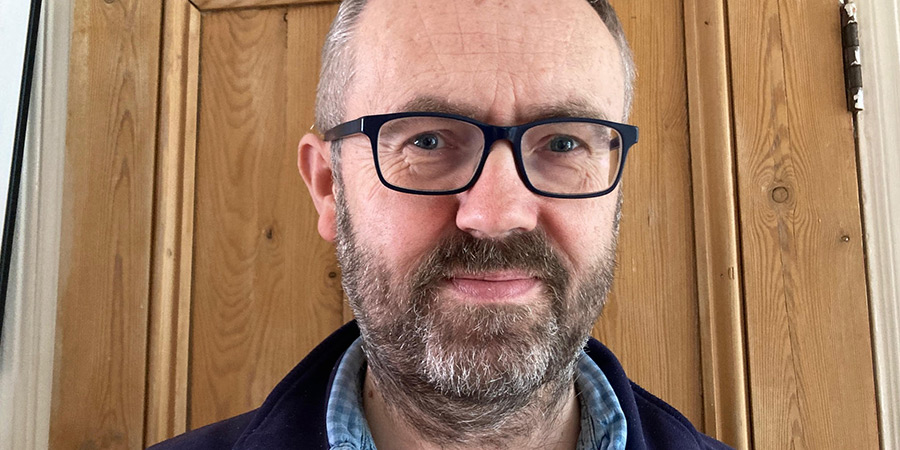
We recently interviewed comedy writer Mark Evans about how his hit Radio 4 sitcom, Bleak Expectations, has transferred to the West End. Mark kindly agreed to answer some additional 'nerdy' writing-related questions too, which we think BCG Pro readers will be interested in.
How long did it take to script the stage show?
That's actually a quite tricky question to answer... I started on it quite a while ago but only in a tinkering way between other projects. Then when I finally had a good, clear chunk of time in the autumn of 2017 (I think...) I sat down and wrote a proper first draft, which took about a month as I recall.
Then there were at least two pretty big rewrites in 2018 before we did a readthrough for friends to see if it worked at all. Both of those drafts probably took a couple of weeks.
I had thoughts after that readthrough... and then when we got offered a slot at The Watermill theatre I did another draft incorporating those thoughts along with notes from the director and producer - probably another week or two.
Then the pandemic happened, delaying everything until we finally got to do the show at The Watermill in May 2022. I definitely did another biggish rewrite before that; took about a week.
Then I did rehearsal rewrites as things worked or didn't work; plus some rewrites after the preview nights and contact with an actual audience... but those were more tweaks than anything.
So we're probably at four proper drafts now, plus some minor tweaks and polishes.
Then we got offered the slot at The Criterion theatre. I did another draft after discussions with the director and producer on our post-Watermill thoughts, and that was a two week job in Jan 2023. Not huge changes, but delicate ones that took time and thought.
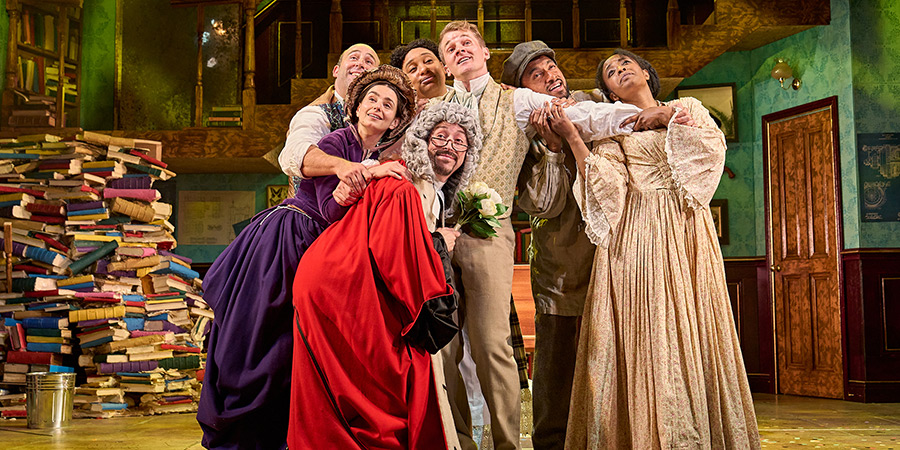
Then we had two weeks of workshops, one for physical comedy and movement, the other for script-work. I tweaked a few things, but I was actually pretty happy with the script by then so felt I was forcing things a bit in trying different things.
After that - sorry, this is a long writing story - I got a whole bunch of notes from the four main producers that had taken over for the West End. Which meant yet another draft. Not vast structural changes - the underlying structure has stayed pretty similar since about the 3rd draft - but juicing up some bits, changing the comedy angle on some scenes, adding more moments for some characters and so on. That was another two weeks or so - again, not huge rewrites, but ones that took care and time so as not to upset the other bits of the show.
Then some rehearsal tweaks, preview tweaks and so on...
Right, that's a long explanation isn't it? To summarise: before The Watermill probably four proper drafts then at least two tweaking, cutting and polishing drafts; after that a more experimental draft for workshops; then a final proper draft before rehearsals for the West End, followed by lots of tweaking, cutting and polishing.
That actually makes it sound like quite a clear cut process... but it felt more complicated! And I definitely saved a couple of drafts by having the characters, a broad story shape and several comedy set-pieces to use from the radio show... even though there's lots of new stuff, there was a good amount of scaffolding to build around.
And, if I'm honest, having seen the show several dozen times in The Criterion, I'd be quite happy to do another draft cutting a few bits down and re-shaping a bit... even if no-one else would ever notice anything wrong with those bits. A perfectionist writer's work is never done...
What were the biggest changes you had to make, to ensure it would play well on the stage?
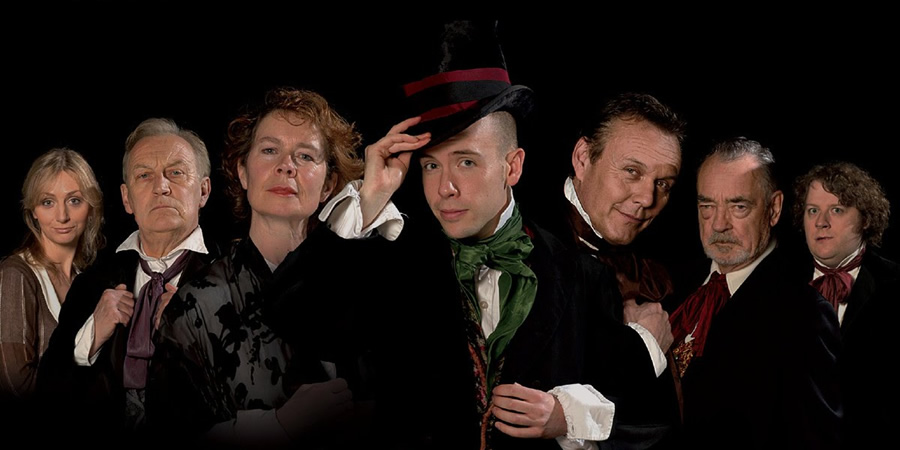
Clearly you're going from an audio medium to a visual one, so making sure jokes were visibly funny as well as audibly so was quite important! Interestingly, I thought I'd find that relatively easy... but as my excellent director, Caroline Leslie, pointed out, at first I tended to write visual jokes that were better suited to TV - the pitfalls of having written lots of TV in the past twenty years and no stage show since Edinburgh 2002!
Then, as I said above, it was trying to get three hours of radio show into two hours of stage show. Some material went easily - we weren't going to be able to do Aunt Lily riding a trained tuna-fish, for example or have a cavalry chase in a salt mine - other bits less so. And I had to lose some characters... namely the just mentioned Aunt Lily who I just couldn't fit into the narrative.
Eventually, I realised the story had to be purely about young Pip, his sisters and best friend Harry Biscuit - in other words, it had to follow the children's journey and their battle against evil adults. That meant disposing of their mother and father for the bulk of the story, and suddenly that clarified the line through.
But then there's the issue of each radio episode being a half hour, each one ending in a cliffhanger. Whereas a stage show is roughly two hours, with one big cliffhanger required in the middle. That meant a lot of throwing out bits of plot, rewriting other chunks and inventing whole new plot points. One review said 'it's basically a direct transcription of the radio series so won't surprise fans' but I assure you it's far from a direct transcription and, beyond broad story arcs, a lot of it is new, different and surprising!
Do you have any devices by which to check the script is funny enough?
That's a very good question. I think it's actually a weird mix of instinct and maths. Sometimes literally checking there are enough jokes on the page but other times going 'I think this scene is big and silly and funny... let's see if it is'.
I do remember while writing the later series of the radio show my process was basically: write a very, very rough draft to see if the story I had in mind for each episode was broadly coherent and funny; then write a tighter, better plotted, more characterful 2nd draft; another draft or two to tighten all that up some more; and then a final, meticulous draft where I'd go through looking at every line to make it as funny as possible, plus adding as many extra jokes as I could.

That's probably the nearest I've ever got to reading final drafts and mentally going 'joke, joke, good joke, joke, really good joke... yes, that is definitely a joke-filled funny script.'
With the stage show I've slightly done that; but it depends so much on contact with an audience that even with my experience and honed instincts I can get things wrong. There are still a couple of jokes which I genuinely believe are really, really good... and they never get a laugh! It's a weird game this comedy thing...
The plot seems really important to the play, but would it be fair to say the characters are still the key to any situational comedy?
Absolutely. I think that without characters who an audience can like/hate/identify with, plot, jokes and silliness just don't hit home. There has to be a story that keeps people interested, but that story can't just be events... it has to be events that happen to people you care about. And I like to think we've got that in the play: there are moments of great jokey silliness that suddenly veer into something more tragic and the audience often go from laughter to a sort of stunned, empathetic silence... meaning they clearly care about the characters. Which is great!
Across the last two decades, what has been the biggest challenge in terms of working on Bleak Expectations? The TV adaptation [The Bleak Old Shop Of Stuff] looks like it might have external influences involved in some decisions?
It's a fact of writing life that the bigger, more high profile and more expensive your project, the greater the number of external influences trying to have their say. With radio, the budget's so low that, frankly, no-one cares enough to interfere! So on the radio show, everyone basically left me and my brilliant producer, Gareth Edwards, alone to do it how we wanted, from scripts to casting to finished product.
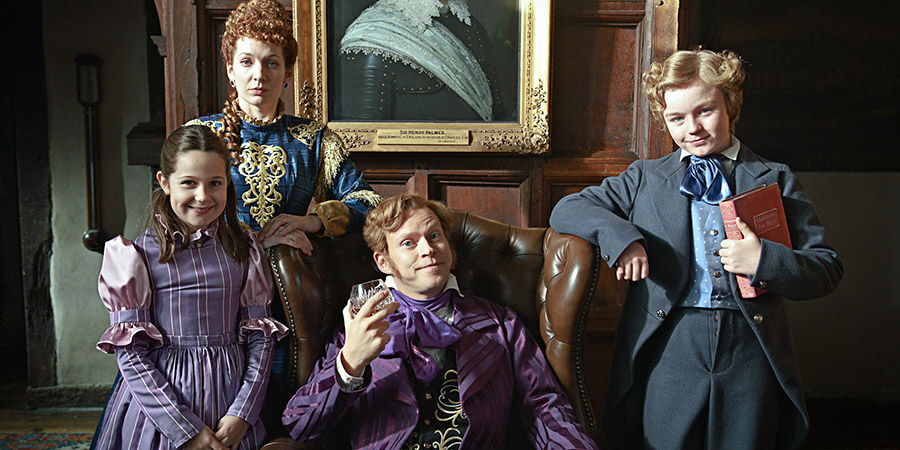
Then we tried to get the radio show onto the TV. And suddenly lots of people had lots of opinions. Because there's much more money involved and because a TV show is much more prominent in the public eye, every decision now seemed to matter in a way that it didn't in the cheaper, lower profile world of radio. It's understandable: if you're an executive about to put a chunk of your budget into a show, you're going to want a say. The trouble is that usually there's more than one executive involved and each one of them has more than one opinion!
So suddenly your job as a writer becomes mostly negotiating a series of notes - sometimes few, sometimes far too many. And you have to interpret those, or write round them, or occasionally just simply do them no matter how much you disagree. And it has to be pointed out: lots of those notes can be great! And no-one ever gives a note from malice! (Or at least I hope not...)
Everyone wants the show to be good, but different people have different thoughts about how to make that happen. And, sometimes, that does end up with a more committee run feel to a project when actually a more focussed, singular vision might have been better: it's a tricky balance to get between executive micro-management and trusting the people actually making the show.
So probably the biggest challenge over the years for Bleak Expectations has been negotiating that world of notes to get what I think the best version of the show I've written onto screen or stage.
That's true for everything I've ever done outside the radio world in the past twenty-seven years as a full-time writer and, though I like to think I'm extremely professional and open in dealing with those external opinions, even now the odd note or set of notes can still drive me mad...
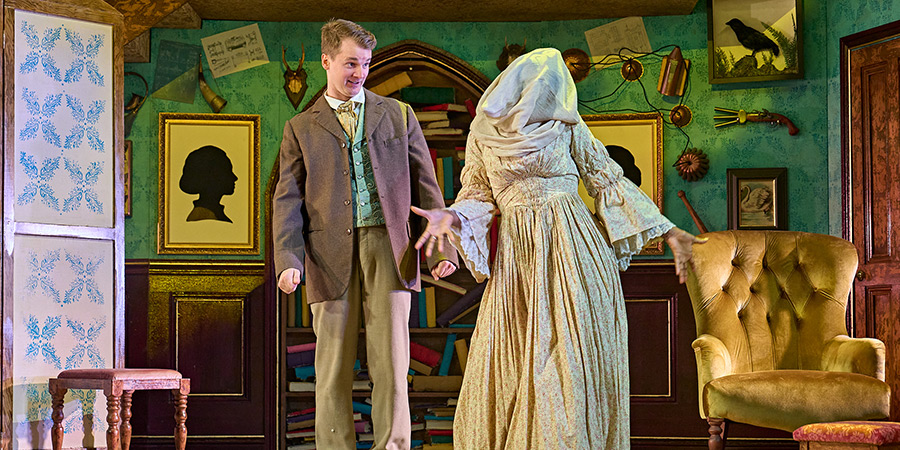
What advice would you give anyone looking to start out in comedy writing?
To steal from Nike: just do it. Honestly, you have to just sit down at a computer or pad of paper and put some words down.
But then you've got to get what you've written out there. If you're also a performer, then get up there and do your material, whether it's stand-up or sketches or whatever. Or if you only want to write, get someone else to do it. Or make it. Film a sketch and put it online. Or make a short film and enter into a competition. What would have taken a whole crew and a bucket-load of kit even twenty years ago can now be done on the phone in your pocket - so use that!
Also, look at submitting stuff to any open-door show. The BBC still does that: go look at BBC Writersroom which is full of opportunities and advice.
In short: write, write, write; if possible do, do, do and make, make, make; plus submit, submit, submit.
The world is more full of content than ever before, but being properly funny is still quite a rare thing. So do your thing and, if it's good, you will eventually get somewhere...
It's been interesting to have watched your characters jump between mediums. When setting out on new comedy projects, will you plan for what might happen in different platforms from the off?
Actually, not really, no. I probably spend more time thinking what platform any idea I have is right for. Should this idea be a sitcom? Or a comedy drama? Or a film? Or a book? Or is it just rubbish and I should just abandon it? Then I just stick with that and go. (That said, a few years ago I had a sitcom optioned and wrote six brief episode summaries for it... then a while later I re-read them and thought 'ah, actually, this would be a much better film...' so re-pitched it as that. Not made yet - in either form!)
Once I've written something, if the opportunity to do it in a different form comes up then great, let's do it. But Bleak Expectations is the only thing I've written that automatically seemed right to do in different forms pretty much from the off. (And I have to say, one day I'd love to do a film version of it...)
This article is provided for free as part of BCG Pro.
Subscribe now for exclusive features, insight, learning materials, opportunities and other tools for the British comedy industry.


